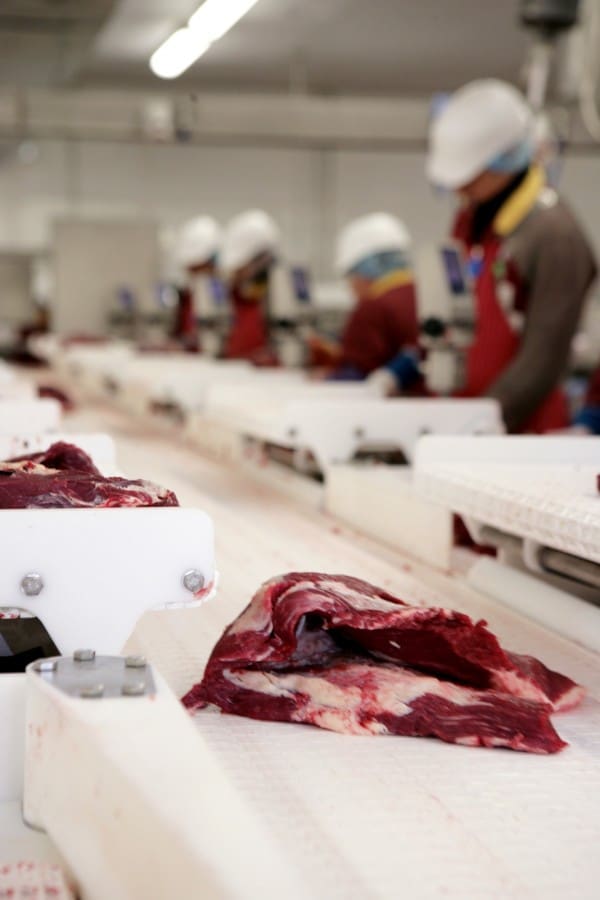 New South Wales and Victorian farmers will gather today at Barnawatha near the states’ border to rally against what is being portrayed by state farm organisations as “the growing market power of meat processors.”
New South Wales and Victorian farmers will gather today at Barnawatha near the states’ border to rally against what is being portrayed by state farm organisations as “the growing market power of meat processors.”
With the Federal Treasurer described as being ‘poised to decide’ on the acquisition of Primo by JBS, farmers are demanding that the decision be put aside until a full investigation into this issue, a joint press statement issued this morning by NSW Farmers and Victorian Farmers Federation says.
The statement claims Primo and JBS ‘compete directly’ and the acquisition would ‘cruel cattle prices for farmers.’
“On 17 February 2015, at least eight processors refused to bid on the first prime sale of cattle at the new Wodonga saleyards in an attempt to force the operators to change the longstanding tradition of pre-weighing cattle for sale,” NSW Farmers and VFF said this morning.
This statement directly contradicts information provided to Beef Central last week by senior management for Regional Infrastructure Pty Ltd, the owner and operator of the new Barnawatha yards, which claimed that the overwhelming majority of processors that did not attend the first Barnawatha sale did so for reasons other than protest over selling systems. In most cases, they simply had adequate stock on hand, RIPL said.
In JBS Australia’s case, the company has pointed to a temporary closure at its Dinmore processing facility as the reason for not operating at the February 17 Barnawatha sale.
As reported on Beef Central earlier, a major breakdown at the plant halted kills for two days, creating a 7000-head ‘backlog’ of cattle that meant the plant had no requirement to source cattle that week from distant sources like Wodonga, significantly, some 1350km from Dinmore.
JBS has provided a report on this episode to the Australian Competition and Consumer Commission, as part of its current investigation based into recent NSWF/VFF concerns.
Only one processor, to Beef Central’s knowledge – Teys Australia – has linked its non-attendance at the sale in question to its concerns over pre-sale weighing systems. Specifically, Teys wanted both post and pre-weigh to be offered, to “allow the market to sort it out.”
The NSWF/VFF claim that processors were “attempting to force the operators to change the longstanding tradition of pre-weighing cattle for sale,” also ignores the fact that pre-weigh selling is in a distinct minority in Victoria, and almost non-existent in most other states.
Processors would argue that there are perfectly good commercial reasons for that. As discussed in this earlier Beef Central article, one assessment suggested that just 20 percent of saleyards cattle in Victoria are pre-sale weighed. That figure is now likely to be lower still, following Barnawatha’s recent decision.
The fundamental reason is that processors object to paying for gut-fill (feed and water) which the animal excretes before it is slaughtered. Cattle that are bought pre-sale weighed often show much greater variance in dressing percentage yields for this reason. This circumstance is clearly recorded in seminal research carried out decades ago by Queensland Livestock and Meat Authority’s Dr Jennifer Wythes and others.
In this morning’s statement VFF livestock president Ian Feldtmann said “The ACCC Competition Compliance Team is investigating the incident, but this is not an isolated problem, it is a symptom of the structural inequity that exists in the cattle market.”
“Market consolidation in the meat processing sector is causing lower returns to farmers and it is time this trend is stopped. The Treasurer must set aside the approval of the JBS acquisition until a full senate inquiry can investigate this issue.”
Derek Schoen, chair of NSW Farmers’ Cattle Committee said: “I am making a direct plea to the Treasurer – put this decision on hold until all the facts are tabled. If we get this decision wrong, farmers will lose.”
“What is the point of protecting our agricultural land from too much foreign acquisition when all of our produce will be processed and controlled by a select few? This is an issue which demands a serious examination of the national interest.”
“Farmers just want a fair go; a fair price for their produce. If the Treasurer approves this decision it will have long term ramifications for cattle farming in Australia,” Mr Schoen said.
